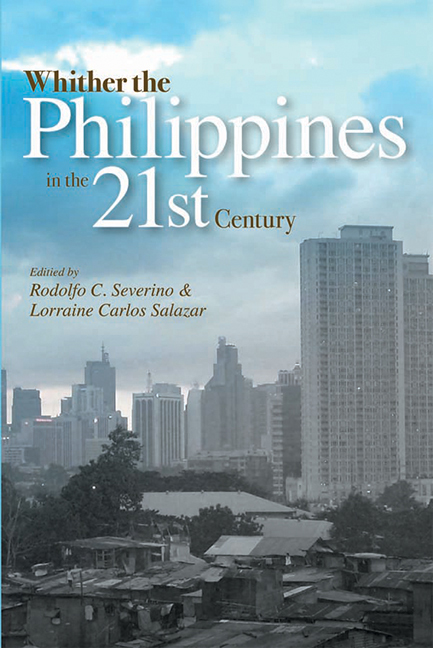Book contents
- Frontmatter
- Contents
- List of Illustrations
- Foreword
- Acknowledgements
- The Contributors
- List of Abbreviations
- Map of Southeast Asia
- 1 The Philippines in Southeast Asia
- 2 From Regime Crisis to System Change
- 3 Proposed Constitutional Reforms for Good Governance and Nation Building
- 4 The Military in Philippine Politics
- 5 Religion and Politics
- 6 The Philippine Press
- 7 Macroeconomic Issues and Challenges
- 8 Investment Climate and Business Opportunities
- 9 Why Does Poverty Persist in the Philippines?
- 10 Diaspora, Remittances, and Poverty
- 11 The Philippine Development Record
- 12 Sancho Panza in Buliok Complex
- 13 The Insurgency That Would Not Go Away
- 14 Whither the Philippines in the 21st Century?
- Index
5 - Religion and Politics
Published online by Cambridge University Press: 21 October 2015
- Frontmatter
- Contents
- List of Illustrations
- Foreword
- Acknowledgements
- The Contributors
- List of Abbreviations
- Map of Southeast Asia
- 1 The Philippines in Southeast Asia
- 2 From Regime Crisis to System Change
- 3 Proposed Constitutional Reforms for Good Governance and Nation Building
- 4 The Military in Philippine Politics
- 5 Religion and Politics
- 6 The Philippine Press
- 7 Macroeconomic Issues and Challenges
- 8 Investment Climate and Business Opportunities
- 9 Why Does Poverty Persist in the Philippines?
- 10 Diaspora, Remittances, and Poverty
- 11 The Philippine Development Record
- 12 Sancho Panza in Buliok Complex
- 13 The Insurgency That Would Not Go Away
- 14 Whither the Philippines in the 21st Century?
- Index
Summary
In a world where economic growth is an obsession and politics more intractable than ever, the study of religion and its place in the lives of people is both fascinating and challenging. Contrary to the thinking that modernity weakens it, religion remains enmeshed in the complex fabric of human societies. Samuel Huntington, for example, cites a “global religious resurgence” happening during the second half of the twentieth century, involving people returning to, reinvigorating, and giving new meaning to the traditional religions of their communities. This revivalism has created a huge impact on the development of selected nations.
For the past several decades, scholars have been enamored with how religion — its system of beliefs, principles, and doctrines, including norms, values and practices — relates to the modernization of different societies. Robert Bellah, in his discussion of Asian modernization, for instance, examines the influence of cultural traditions, including religion, in building the modern nation-state. This is complemented by Peter Berger's analysis of religion and secularity. Pointing to a phenomenon of Asian religiosity, Berger talks about how culture has contributed to defining and molding Asia's own brand of modernity. The transformation of Confucianism from being an imperial state ideology to an everyday ethic of working people is the most widely celebrated example of this phenomenon. Complementary contrasts also exist within this Asian religiosity. For instance, while Indian Buddhism practices a “concomitant deprecation of all worldly activity, including economic activity”, Chinese Buddhism rejects this “world-denying” creed and favours a “world- affirming” doctrine. In contemporary Japanese religions, meanwhile, “pragmatic, even technical, this-worldliness” is emphasized and the individual is encouraged to strive for personal success.
Gilles Kepel, meanwhile, points to the resurgence of the great religions of Islam, Christianity and Judaism in the modern world. In his study, he observes that a new religious approach has taken shape, aimed no longer at adapting to secular values but at recovering a sacred foundation for the organization of society, by changing it if necessary.
- Type
- Chapter
- Information
- Whither the Philippines in the 21st Century? , pp. 100 - 126Publisher: ISEAS–Yusof Ishak InstitutePrint publication year: 2007



